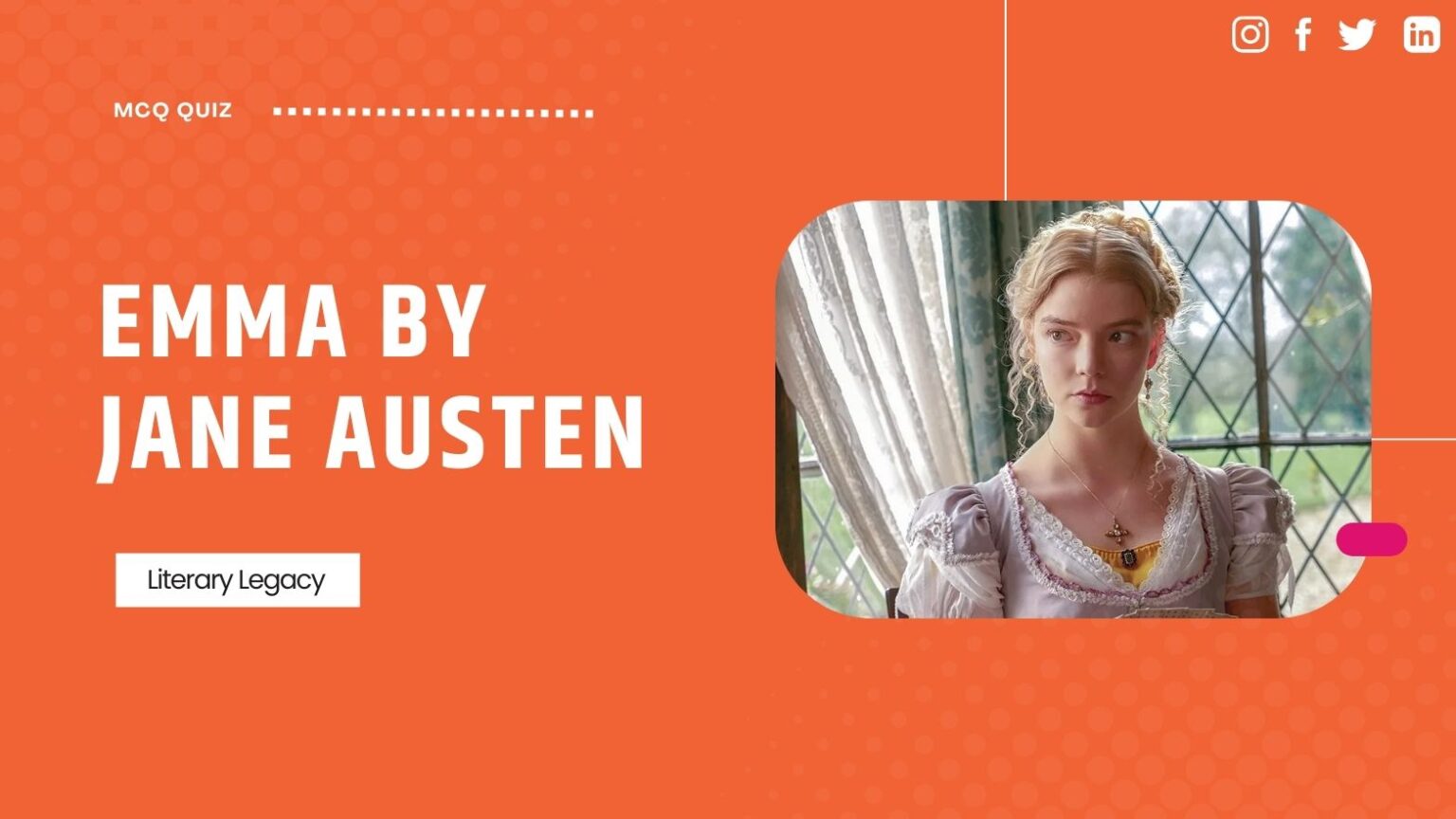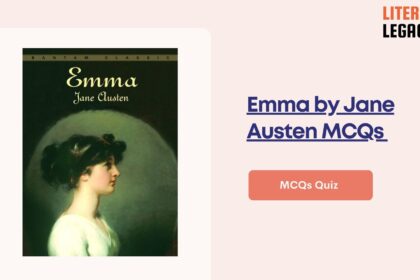1. What role does Emma Woodhouse primarily take on in the novel?
A) A governess for Harriet Smith
B) A matchmaker for her friends
C) A romantic interest for Mr. Knightley
D) A critic of societal norms
Answer: (B)
A matchmaker for her friends
Emma Woodhouse actively engages in matchmaking for her friends, believing herself to be skilled in the art.
2. Which character discourages Emma’s matchmaking efforts?
Choices
A) Mr. Knightley
B) Mr. Elton
C) Mr. Martin
D) Harriet Smith
Answer: (A)
Mr. Knightley
Mr. Knightley serves as a voice of reason, warning Emma about her misguided matchmaking attempts.
3. What central theme is explored through Emma’s character development?
Choices
A) The complexity of friendship
B) Political change in England
C) The importance of wealth
D) Self-awareness and personal growth
Answer: (D)
Self-awareness and personal growth
Emma’s personal growth and self-awareness are crucial to the novel’s narrative arc.
4. What significant realization does Emma come to by the end of the story?
Choices
A) She should continue matchmaking despite her failures
B) Her pride blinded her to the true feelings of others
C) She is not cut out for romance
D) Her judgment was infallible all along
Answer: (B)
Her pride blinded her to the true feelings of others
Emma learns that her pride prevented her from recognizing the true dynamics of her relationships.
5. Which character does Emma initially set Harriet Smith to pursue?
Choices
A) Mr. Martin
B) Mr. Knightley
C) Mr. Weston
D) Mr. Elton
Answer: (D)
Mr. Elton
Emma encourages Harriet to pursue Mr. Elton, mistakenly believing he is interested in her.
6. What social class does Harriet Smith belong to?
Choices
A) Lower class
B) Noble class
C) Middle class
D) Upper class
Answer: (A)
Lower class
Harriet’s lower-class status is a focal point of Emma’s matchmaking attempts.
7. Emma believes her friend Harriet deserves a match with which type of individual?
Choices
A) A farmer
B) A laborer
C) A gentleman
D) An artist
Answer: (C)
A gentleman
Emma is convinced that Harriet, despite her unknown parentage, deserves to marry a gentleman.
8. What does Emma initially think about Mr. Elton’s interest?
Choices
A) It is non-existent
B) It is directed towards Harriet
C) It is directed towards herself
D) It is directed towards Jane Fairfax
Answer: (B)
It is directed towards Harriet
Emma misinterprets Mr. Elton’s signs as interest in Harriet rather than recognizing they are meant for her.
9. What impact did the publication of Emma have concerning its cultural significance?
Choices
A) It was seen as a historical document
B) It highlighted social customs and relationships
C) It served as a romantic guide
D) It criticized government policies
Answer: (B)
It highlighted social customs and relationships
Emma is praised for its insightful commentary on early 19th-century social customs and relationships.
10. Who played the role of Emma Woodhouse in the 2020 film adaptation?
Choices
A) Emma Stone
B) Keira Knightley
C) Lily James
D) Anya Taylor-Joy
Answer: (D)
Anya Taylor-Joy
Anya Taylor-Joy starred as Emma Woodhouse in the 2020 film adaptation of Jane Austen’s novel.
11. What causes Emma to ultimately feel remorse about her behavior towards Miss Bates?
Choices
A) Mr. Knightley expresses his disapproval.
B) Harriet tells her she feels uncomfortable.
C) Mrs. Weston reprimands her.
D) She overhears Miss Bates speaking about her.
Answer: (A)
Mr. Knightley expresses his disapproval.
Emma’s remorse is triggered when Mr. Knightley reprimands her for mocking Miss Bates, which leads her to reflect on her actions.
12. What misconception does Emma hold regarding Frank Churchill’s affections?
Choices
A) She thinks he is genuinely interested in Harriet.
B) She believes Frank is not interested in her.
C) She suspects he is secretly engaged to Jane Fairfax.
D) She believes he is flirting with Mrs. Elton.
Answer: (A)
She thinks he is genuinely interested in Harriet.
Emma mistakenly thinks that Frank Churchill’s attentions are directed towards Harriet, while in reality, he is courting her.
13. What ultimately prompts Emma to realize her own feelings for Mr. Knightley?
Choices
A) Hearing Jane Fairfax’s romantic troubles.
B) Harriet revealing her love for Mr. Knightley.
C) Mr. Knightley’s proposal to Harriet.
D) Frank Churchill’s engagement to Jane.
Answer: (B)
Harriet revealing her love for Mr. Knightley.
Emma becomes aware of her love for Mr. Knightley after Harriet confesses her own feelings for him, which triggers Emma’s realization.
14. How does social class significantly impact relationships in the novel?
Choices
A) It encourages characters to marry for wealth alone.
B) It creates barriers that prevent true love.
C) It leads to equal treatment across different classes.
D) It dictates who issues invitations and friendships.
Answer: (D)
It dictates who issues invitations and friendships.
Characters of higher social class control social situations and relationships, which illustrates the importance of propriety in 18th Century English society.
15. What is Emma’s view on marriage at the beginning of the novel?
Choices
A) She thinks it should be based solely on love.
B) She finds it to be a restrictive institution for women.
C) She sees it as a financial necessity.
D) She believes it is the only way to gain social status.
Answer: (B)
She finds it to be a restrictive institution for women.
From the outset, Emma expresses a desire to remain single, seeing marriage as a limitation to her independence.
16. What significant role do letters play in the novel?
Choices
A) They function as a means of social invitation.
B) They are used to express true emotions directly.
C) They communicate secret plans among the characters.
D) They mislead characters into misunderstandings.
Answer: (D)
They mislead characters into misunderstandings.
Letters contribute to misinterpretations of romance and relationships throughout the story, fueling the novel’s central misunderstandings.
17. What does Mr. Knightley warn Emma about Frank Churchill?
Choices
A) That he is not truly enamored with her.
B) That he is secretly engaged to Jane.
C) That he has poor intentions towards Harriet.
D) That he will break her heart.
Answer: (A)
That he is not truly enamored with her.
Mr. Knightley expresses his concerns about Frank’s superficial nature and warns Emma that his interest in her may not be sincere.
18. What does the ending of the novel signify about relationships?
Choices
A) Social class ultimately dictates marriage compatibility.
B) Marriages often lead to disappointment.
C) Happy unions can arise despite misunderstandings.
D) True love is difficult to find.
Answer: (C)
Happy unions can arise despite misunderstandings.
The novel concludes with three marriages that highlight the complexity of relationships, suggesting that joy can coexist with earlier misunderstandings.
19. How does Emma feel about her matchmaking abilities throughout the novel?
Choices
A) Confident she can predict outcomes accurately.
B) Considers herself an expert in romance.
C) Admits she is not skilled at understanding love.
D) Believes she has failed at making matches.
Answer: (A)
Confident she can predict outcomes accurately.
Emma’s confidence in her matchmaking skills is shown through her manipulation of relationships, which later proves misguided.
20. What ultimately leads to the revelation of Frank and Jane’s secret engagement?
Choices
A) A confrontation between Frank and Mr. Knightley.
B) Jane announcing it to her friends.
C) Emma’s accidental discovery of their letters.
D) The death of Mrs. Churchill.
Answer: (D)
The death of Mrs. Churchill.
The death of Mrs. Churchill sets off events that reveal Frank Churchill’s true engagements and intentions, affecting multiple character relationships.
21. What is a central theme in the story of Emma?
Choices
A) The pursuit of artistic success
B) The comedic misadventures of a matchmaker
C) The quest for wealth and status
D) The dedication to family legacy
Answer: (B)
The comedic misadventures of a matchmaker
Emma explores the comedic and romantic entanglements of its protagonist as she attempts to play matchmaker.
22. How does Emma’s view of her matchmaking abilities change throughout the story?
Choices
A) She becomes more confident in her skills
B) She trains Harriet in the art of matchmaking
C) She decides to abandon all social interactions
D) She realizes her judgment was flawed
Answer: (D)
She realizes her judgment was flawed
Emma’s journey leads her to recognize that her personal pride and desires have blinded her to the true nature of relationships.
23. What mistaken belief does Emma have regarding Mr. Elton’s affections?
Choices
A) He harbors feelings for her sister
B) He is a confirmed bachelor
C) He prefers a wealthy widow
D) He is interested in Harriet
Answer: (D)
He is interested in Harriet
Emma interprets Mr. Elton’s signs as expressing his interest in Harriet, but they are actually directed toward her.
24. Which social custom does Emma’s character primarily challenge?
Choices
A) Women’s independence
B) Marriage based on love
C) The role of governesses
D) Class barriers in matchmaking
Answer: (D)
Class barriers in matchmaking
Emma believes Harriet deserves a match with a gentleman despite her lower-class background, highlighting class issues in matchmaking.
25. What results from Emma’s matchmaking attempt between Harriet and Mr. Elton?
Choices
A) They expose traditional marriage norms
B) They get happily married
C) It leads to heartbreak for Harriet
D) They become friends
Answer: (C)
It leads to heartbreak for Harriet
Emma’s misguided efforts lead to Harriet’s heartbreak, which serves as a wake-up call for Emma.
26. Which character closely observes Emma’s behavior and offers her advice?
Choices
A) Miss Bates
B) Mr. Knightley
C) Mr. Weston
D) Harriet Smith
Answer: (B)
Mr. Knightley
Mr. Knightley is a long-time friend who discourages Emma’s matchmaking pursuits.
27. What does Emma initially think about Harriet’s suitability for Mr. Martin?
Choices
A) She believes he is too good for Harriet
B) She supports the match
C) She considers him to be beneath Harriet’s status
D) She is indifferent about the relationship
Answer: (C)
She considers him to be beneath Harriet’s status
Emma believes Mr. Martin is below Harriet due to her own biases regarding social status.
28. What does Emma resolve to do by the end of the novel regarding matchmaking?
Choices
A) Find a suitable match for herself instead
B) Start a matchmaking service in Highbury
C) Never attempt matchmaking again
D) Continue matchmaking but with more care
Answer: (C)
Never attempt matchmaking again
Emma realizes her mistakes and vows not to engage in matchmaking in the future.
29. How is the character of Emma Woodhouse described?
Choices
A) Clever, but lacking in social graces
B) Modest, shy, and reserved
C) Rich, ambitious, and self-centered
D) Wealthy, beautiful, and privileged
Answer: (D)
Wealthy, beautiful, and privileged
Emma is characterized as a rich, beautiful, and privileged young woman who believes in her matchmaking prowess.
30. What element of society does Jane Austen critique through her portrayal of Emma’s character?
Choices
A) The superficiality of social status
B) The pressures of industrialization
C) The independence of the lower classes
D) The role of education for women
Answer: (A)
The superficiality of social status
Austen satirizes the societal norms and expectations regarding class and relationships prevalent during the Regency era.
31. What does Emma initially suspect about Jane Fairfax’s relationship with Mr. Dixon?
Choices
A) They have a romantic involvement.
B) They are engaged.
C) They are related.
D) They were never in love.
Answer: (A)
They have a romantic involvement.
Emma’s jealousy leads her to suspect that Jane is romantically involved with Mr. Dixon.
32. How does Mr. Knightley view Frank Churchill’s personality?
Choices
A) Generous and thoughtful.
B) Superficial and silly.
C) Charming and likable.
D) Intelligent and witty.
Answer: (B)
Superficial and silly.
Mr. Knightley finds Frank Churchill to be superficial and silly from their first meeting.
33. What triggers Emma’s realization of her own feelings for Mr. Knightley?
Choices
A) Harriet’s confession of her love for Mr. Martin.
B) Harriet’s love for Mr. Knightley.
C) Frank’s rejection of Emma.
D) Emma’s jealousy over Mr. Elton.
Answer: (B)
Harriet’s love for Mr. Knightley.
Emma’s distress over Harriet’s romantic feelings for Mr. Knightley ultimately leads to her own realization of love.
34. What significant event prompts the revelation of Frank and Jane’s secret engagement?
Choices
A) Mr. Knightley’s proposal to Harriet.
B) Janes arrival in Highbury.
C) Frank’s wish to become a governess.
D) Mrs. Churchill’s death.
Answer: (D)
Mrs. Churchill’s death.
The death of Mrs. Churchill sets into motion the revelation of Frank and Jane’s secret engagement.
35. Which character does Emma believe is a potential match for Harriet?
Choices
A) Mr. Martin.
B) Mr. Elton.
C) Frank Churchill.
D) Mr. Knightley.
Answer: (C)
Frank Churchill.
Emma encourages what she thinks is Harriet’s interest in Frank Churchill.
36. What aspect of social class is highlighted through Emma’s interactions?
Choices
A) All characters are of equal social standing.
B) Lower classes often control social invitations.
C) Marriage has no relation to social standing.
D) The rich and well-bred dominate social interactions.
Answer: (D)
The rich and well-bred dominate social interactions.
The rich and well-bred control social situations in Emma’s social circle.
37. What does Emma regret after Mr. Knightley rebukes her?
Choices
A) Ignoring Jane’s feelings.
B) Her treatment of Harriet.
C) Her attraction to Frank.
D) Mocking Miss Bates.
Answer: (D)
Mocking Miss Bates.
Emma feels great remorse for mocking Miss Bates after Mr. Knightley reprimands her.
38. What ultimately leads to the conclusion of the novel with multiple marriages?
Choices
A) Revelation of Frank’s true feelings.
B) Reconciliation between Emma and Harriet.
C) Successful matchmaking by Emma.
D) Social acceptance of mixed class marriages.
Answer: (C)
Successful matchmaking by Emma.
The novel concludes with multiple marriages resulting from Emma’s matchmaking, despite her many misperceptions.
39. What did Emma decide about her own marital status at the beginning of the novel?
Choices
A) She chose to remain single.
B) She hoped to marry Frank Churchill.
C) She was seeking a governess position.
D) She wanted to marry Mr. Elton.
Answer: (A)
She chose to remain single.
Emma initially decided to stay single, feeling financially self-sufficient and at the top of her social hierarchy.
40. What issue does Emma misperceive concerning Harriet Smith’s affections?
Choices
A) That Harriet is in love with Frank Churchill.
B) That Harriet is indifferent towards Mr. Knightley.
C) That Harriet secretly loves Mr. Elton.
D) That Harriet wants to remain single.
Answer: (A)
That Harriet is in love with Frank Churchill.
Emma incorrectly believes Harriet is in love with Frank when, in fact, Harriet loves Mr. Knightley.



